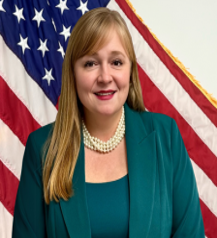
Beoncia M. Loveless began her career as an intern with the Medical Examiner’s Office at the Georgia Bureau of Investigation in January 1999, and she was offered a full-time position as a death investigator upon completion of her internship. She moved to Delaware County, Pennsylvania and worked in that county’s Medical Examiner’s Office in 2000-2001, where she was exposed to the Child Fatality Review process; her interest in child fatalities and child maltreatment increased when she returned to the GBI in 2002. In 2006, she was promoted to the Program Coordinator for the Child Abuse Investigative Support Center, a specialized unit within the Medical Examiner’s Office which focused exclusively on juvenile deaths and maltreatment cases. She held that position until her departure from the GBI in December 2016.
Throughout her tenure with the GBI, Beoncia trained extensively, educating law enforcement officers, child protection personnel, first responders, and mandated reporters on a variety of topics related to juvenile death and maltreatment investigations. Beoncia obtained Board Certification with the American Board of Medicolegal Death Investigators in 2005 and she is member of the National Association of Medical Examiners. She is a member of the Children’s Justice Act Task Force, a federally mandated Child Abuse Prevention and Treatment Act (CAPTA) Panel, and she leads the subcommittee for Child Fatality Investigations. She is also a member of the Advisory Council for the Child Welfare Training Collaborative, and she was a contributing author to Recognizing When a Child’s Injury or Illness is Caused by Abuse, a Department of Justice guideline for investigating child maltreatment, which was updated in 2014. Beoncia joined the Child Death/Serious Injury/Near Fatality Unit in the state office of the Georgia Division and Family and Children Services in February 2020, providing her expertise during the unit’s reviews of child deaths utilizing the principles of Safety Science to identify systemic challenges in child welfare and develop areas for improvement. Beoncia left DFCS in November 2024 to assume her current position as Director of Operations in the DeKalb County Medical Examiner’s Office.
Beoncia was a professor at Southern Crescent Technical College from January 2014-June 2021 and transferred to Chattahoochee Technical College in August 2021; she currently teaches Introduction to Forensics, Death Investigation, and Crime Scene Processing classes. Beoncia obtained her Bachelor’s Degree in Criminal Justice from the University of Georgia in 1999 and her Master’s Degree in Criminal Justice and Public Safety Leadership from Mercer University in 2018. Beoncia was awarded the University of Georgia's Criminal Justice Society Outstanding Alumni Award and Mercer University’s Outstanding Graduate Student in Criminal Justice and Public Safety Leadership. Beoncia is on the Board of the McCleskey-East Cobb YMCA and conducts BeSMART presentations, an educational, public-health oriented training to prevent gun injuries and deaths among children. Beoncia lives in Marietta with her husband, James Loftin, and her children, Evan and Taylor.
Department Summary – Medical Examiner's Department
The medical examiner performs investigations into deaths that are required by law to be reported to the DeKalb County Medical Examiner, and which fall under the jurisdiction of the Georgia Death Investigation Act, O.C.G.A. § 45-16-24. The reporting of death cases as required by this law is done seven days a week, 24 hours a day, weekends and all holidays.
A medical examiner's inquiry is required on all deaths that come within the purview of the law, and this investigation must start immediately. This inquiry may include, but is not limited to, obtaining a detailed history on the decedent and the circumstances surrounding the event, a scene investigation, a scene reconstruction, an external examination, a limited dissection, an autopsy, a post autopsy investigation including laboratory studies, or any combination thereof. Evidence may be collected at the scene, and the body removed from the location of death to the DeKalb Forensic Science Center/Morgue Facility. Once cause and manner of death is determined, a death certificate is issued.